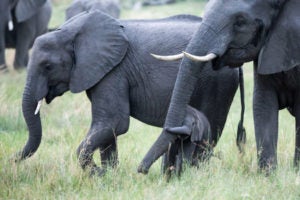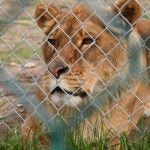
MONTREAL – At a time when African nations are contending with an elephant poaching crisis that has caused devastating population declines, it has come to light that the annual Toronto Sportsmen’s Show continues to allow three vendors to sell elephant trophy hunting excursions that further threaten these magnificent animals. The Ivory-Free Canada Coalition, a partnership of Canadian non-profit organizations, including Humane Society International/Canada, the Jane Goodall Institute of Canada, World Elephant Day, Elephanatics, and the Global March for Elephants & Rhinos – Toronto, are calling on organizers to drop these outfitters from the event, and demand the Canadian Government take immediate action in banning the import, domestic sale, and export of all elephant ivory, including hunting trophies.
Recently The Ivory-Free Canada Coalition helped to thwart the Calgary chapter of Safari Club International from auctioning off an elephant hunt in Botswana. This latest exposition includes three vendors attempting to profit from African elephant trophy hunting.
Michael Bernard, Deputy Director – HSI/Canada, stated: ” Elephants suffer horribly in trophy hunts. They are shot and left in agony for extended periods of time, they die painfully, and their social groups are disrupted, all to produce trophies for wealthy hunters who enjoy killing for fun. There is nothing sporting about the destruction of animals already contending with the devastating impacts of ivory poaching. In Canada, we are calling for a federal ban on elephant ivory trade, which would prevent hunters from bringing ivory tusks back to Canada, and remove a major incentive for elephant trophy hunting. In the meantime, this event should certainly respect Canadian values by excluding such exhibits.”
Fran Duthie, President of Elephanatics, added: “Science shows trophy hunting causes physiological and psychological effects to elephants. It increases their stress levels, which has led to aggressive behaviour towards humans and communication breakdown within their social structure. The long-term impact of ‘traumatic conservation’ methods on elephants is evident and needs to end”.
Patricia Sims, Founder of World Elephant Day and President – World Elephant Society, also stated: “The trophy hunting of elephants is atrocious and unnecessary, and hurts their vulnerable populations. Elephants are a vital keystone species, they are the caretakers of their habitats and climate change mitigators in their role of maintaining biodiversity. Killing elephants ultimately destroys habitats and Canada needs to take a stand now to ban elephant ivory and protect elephants for their survival and the health of our planet.”
Heather Craig, Co-Founder and President Global March for Elephants & Rhinos – Toronto, stated: “The world woke up to the horrific practice of trophy hunting in 2015 when Cecil the lion was killed by an American trophy hunter. Despite global outrage, hundreds of elephants and rhinos are killed every year. It is beyond our comprehension that the Toronto Sportsmen’s Show continues to allow outfitters to sell hunting trips, contributing further to a declining wildlife population.”
A staggering 20,000 African elephants are killed each year. Scientists anticipate they will be extinct in the wild within 20 years if threats continue. While poaching is the main threat to elephants, legal trophy hunting only exacerbates the threat and drives up the demand for elephant ivory.
Both the Convention on International Trade of Endangered Flora and Fauna (CITES) and members of the International Union for Conservation of Nature (IUCN) have asked all countries to ban their domestic trade of ivory to save elephants. At least nine countries and 10 US states have done so. At the last IUCN Congress, Canada – along with Japan, Namibia and South Africa – refused to support the motion on domestic ivory trade bans.
Over 100 African elephant tusks were imported into Canada as hunting trophies over the past decade, according to the data Canada reported to CITES in its annual trade reports. Yet exporting countries reported that over 300 African elephant tusks were exported to Canada in this same time period. The reason for the discrepancy is unknown.
In order to press the Canadian government into action, the Ivory-Free Canada Coalition launched a petition to ban elephant ivory and hunting trophies at change.org/ivoryfreecanada. With over 540,000 signatures, it is one of the largest Canadian petitions on Change.org for 2019. The Ivory-Free Canada Coalition has been actively campaigning on this issue since 2016 and will continue to do so until a ban is put in place.
For interviews and/or more information, please call or email the media contact below.
-30-
Media contact: Christopher Paré, director of communications, HSI/Canada – office: 514-395-2914 x 206, cell: 438-402-0643, email: cpare@hsi.org
The Ivory-Free Canada Coalition is a partnership of non-profit organizations petitioning the Canadian government to ban the import, domestic trade and export of all elephant ivory, including hunting trophies. The coalition includes Elephanatics, Global March for Elephants & Rhinos – Toronto, World Elephant Day, Humane Society International/Canada and the Jane Goodall Institute of Canada. Sign the Petition: www.change.org/ivoryfreecanada



